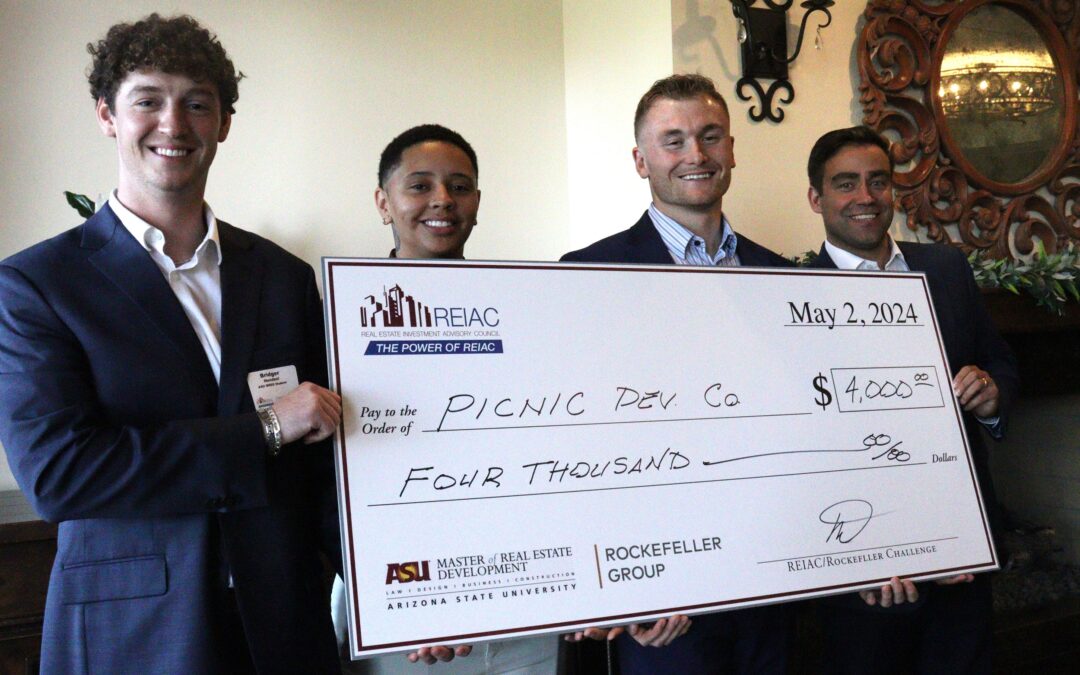PHOENIX, ARIZ. (May 7, 2024) – Transit-oriented residential and retail. Two senior housing projects. An arts and entertainment project.
When the dust settled at the 11th annual REIAC/Rockefeller Group Challenge at Arizona Country Club, it was Picnic Development with The Gem that took home the cash prize of $1,000 per team member among the four teams of graduating Masters of Real Estate Development (MRED) students from Arizona State University’s W. P. Carey School of Business.
This year the competing teams presented their response to a request for development proposal created by MRED and the City of Mesa for a 7.65-acre parcel of land located at the NEC of Main Street and North Stapley Drive owned by Mesa.
“Each year this event provides a competition; a great time to get together and see the work the MRED students do. We had a unique problem this year,” explained Mark Stapp, director of the MRED program. “We started with eight teams. In discussing the top three, there was lively debate. We pared it down to five. It was a hard decision, but we decided on four teams, giving the City of Mesa the final decision.
“This year’s project was much different than last year. A small parcel with a former Mervyn’s building; last year it was 218 acres owned by the Mayo Clinic. The assignment was to create a mixed-use, high-density, urban-infill development that includes an affordable housing component which capitalizes on public transportation,” Stapp added.
The winning team was Keyonna Martinez, Kevin Winkler, Nicholas Anderson, and Bridger Hendzel with Picnic Development for The Gem, and arts and entertainment project.
The Gem represents entertainment, dining, and art. Team members called it a place that offers help, happiness, and contentment. It’s a three-tenant, adaptive reuse project that includes a 10,000 SF OHSO restaurant with indoor and outdoor space; Electric Playhouse, an immersive art and entertainment component; and Mesa Youth Sports, a 55,000 SF facility with playing fields. The project includes an art pavilion and is located on the Metro light rail. The Gem creates a sense of space; bringing more happiness and contentment to the City of Mesa.
“For the past 11 years, we have produced graduates that the industry wants. These are graduates going into the industry and becoming industry leaders,” Stapp said. “Although there is one winner in the Challenge, all student teams do excellent work. Each year we have great people involved, and even greater development projects to judge.
“It’s the faculty that delivers the content that’s so important to people in the industry. That was especially true for this particular assignment. The mentors and students alike were phenomenal. This is as rich and as real as we can make it,” Stapp added.
The other finalists and their projects:
♦️ Dash Development, Avalonia Mesa: Ryan Ban, Ryan Desanto, Jalyn Guardado, and Simbarashe Maketa presented a development that is transit-oriented with residential and retail. The retail component is child care, veterinary care, and The Soda Shop, a meeting space for Avalonia Mesa. The multifamily component comprises 194 workforce and market-rate apartment units. The project includes open nature spaces.
♦️ Main Street Partners, Sherwood Square: John Salter, Daniel Steddum, Justin Trexler, and Glen Wirth presented an active adult community with 237 units. It features a 90,000 SF building and will partner with Christian Care Mesa. It’s not about aging, the team said, it’s about health. The community aims to provide housing and a vibrant, socially engaging lifestyle tailored to its residents’ preferences and needs.
♦️ New Horizon, Development, La Dalia: Quentin Hick, Caeley Stephenson, Jedediah Welsh, and Robert Wolfsen aimed to add synergy to the site with La Dalia, a 197-unit, 12-duplex senior housing project. It is a mix of independent living and 6,000 SF of retail. Amenities include a fitness center, club room, and transportation. The retail component will feature a restaurant plaza.
Each team was allotted 10 minutes to present a development solution followed by questions from the audience. Audience members chose the winning team immediately after the presentations.
“I continue to be impressed by the scope and execution of the presentations. This is a testament to the quality of the MRED program at ASU under the direction of Mark Stapp and his faculty who consistently turn out graduates ready to contribute to our industry,” said Mark Singerman, Rockefeller Group Vice President/Regional Director and past REIAC Southwest President. “Rockefeller Group is extremely proud to have its name associated with this great program.”
About REIAC
The Real Estate Investment Advisory Council (REIAC) was established as a nonprofit trade association to provide a forum for the exchange of ideas, concerns and experiences among senior executives who conduct commercial real estate transactions. The invitation-only group limits its membership to senior-level executives at companies, who act as principals, and whose function is to develop, acquire, manage and/or finance commercial real estate. Institutional quality programs and peer-to-peer relationship-building opportunities have established REAIC’s reputation throughout the national real estate investment community as one of its premier associations. www.reiac.org
About MRED
In nine months, the W. P. Carey Master of Real Estate Development (MRED) prepares students to lead real development projects that are environmentally respectful, socially responsible, and artfully designed. The MRED program is transdisciplinary, aligning principled instruction with dynamic real-world application. MRED is a unique partnership between four highly regarded schools within Arizona State University:
- The W. P. Carey School of Business
- The Sandra Day O’Connor College of Law
- The Herberger Institute for Design and the Arts
- The Del E. Webb School of Construction https://programs.wpcarey.asu.edu/masters-programs/real-estate-development
###

